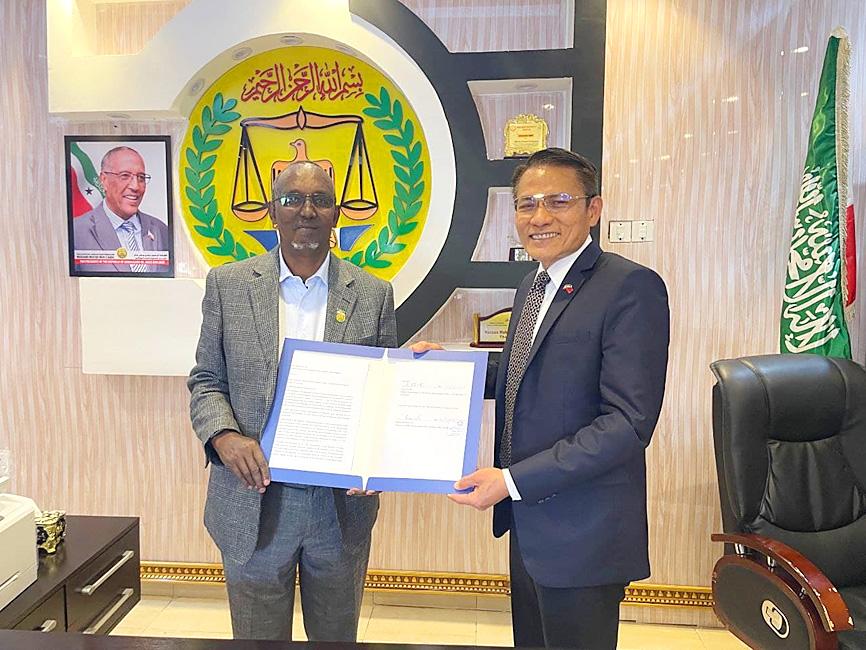Taiwan yesterday announced that it would donate 150,000 doses of the domestically developed Medigen COVID-19 vaccine to Somaliland as part of its continued assistance to the self-governing east African state to combat the pandemic.
The pledge was made after Taiwan Representative Office in the Republic of Somaliland head Wu Chen-chi (吳鎮祺) and Somaliland Minister of Health Hassan Mohamed Ali Gafathi signed an agreement at an event in Somaliand’s capital, Hargeisa, on Monday, the Ministry of Foreign Affairs said in a news release.
The donation is to be made as Africa faces a huge wave of cases of the Omicron variant of SARS-CoV-2, it said.

Photo courtesy of the Ministry of Foreign Affairs via CNA
Health authorities in Somaliland have granted emergency use authorization (EUA) for the Medigen vaccine, it said.
Medigen is the only domestically developed COVID-19 vaccine that has received an EUA from the Food and Drug Administration. Its rollout in Taiwan began on Aug. 23.
So far, no other country has granted Medigen an EUA.
Medigen’s COVID-19 vaccine is undergoing clinical trials in Paraguay and is to take part in the Solidarity Trial Vaccines platform, an international clinical trial platform launched by the WHO and other groups.
Somaliland declared independence from Somalia in 1991.
It has offices in about a dozen countries, the Web site of the Somaliland Ministry of Foreign Affairs says.
It does not have formal diplomatic ties with any nation.
In February last year, Taiwan and Somaliland signed an agreement to establish reciprocal representative offices.
In October, Taiwan donated a batch of domestically produced oxygen generators to Somaliland.
Previous donations from Taiwan of protective equipment and test kits have proved a lifeline in the de facto independent territory of 3.5 million people.
“Taiwan has contributed more than 90 percent of COVID-19 supplies to Somaliland,” the Republic of Somaliland Representative Office in Taiwan said at the time.
Ali Gafadhi praised the quality of the supplies from Taiwan.
He promised to utilize the contributions to their fullest to combat the virus.

Intelligence agents have recorded 510,000 instances of “controversial information” being spread online by the Chinese Communist Party (CCP) so far this year, the National Security Bureau (NSB) said in a report yesterday, as it warned of artificial intelligence (AI) being employed to generate destabilizing misinformation. The bureau submitted a written report to the Legislative Yuan in preparation for National Security Bureau Director-General Tsai Ming-yen’s (蔡明彥) appearance before the Foreign Affairs and National Defense Committee today. The CCP has been using cognitive warfare to divide Taiwanese society by commenting on controversial issues such as Taiwan Semiconductor Manufacturing Co’s (TSMC, 台積電) investments in the

INVESTIGATION: The case is the latest instance of a DPP figure being implicated in an espionage network accused of allegedly leaking information to Chinese intelligence Democratic Progressive Party (DPP) member Ho Jen-chieh (何仁傑) was detained and held incommunicado yesterday on suspicion of spying for China during his tenure as assistant to then-minister of foreign affairs Joseph Wu (吳釗燮). The Taipei District Prosecutors’ Office said Ho was implicated during its investigation into alleged spying activities by former Presidential Office consultant Wu Shang-yu (吳尚雨). Prosecutors said there is reason to believe Ho breached the National Security Act (國家安全法) by leaking classified Ministry of Foreign Affairs information to Chinese intelligence. Following interrogation, prosecutors petitioned the Taipei District Court to detain Ho, citing concerns over potential collusion or tampering of evidence. The

‘COMPREHENSIVE PLAN’: Lin Chia-lung said that the government was ready to talk about a variety of issues, including investment in and purchases from the US The National Stabilization Fund (NSF) yesterday announced that it would step in to staunch stock market losses for the ninth time in the nation’s history. An NSF board meeting, originally scheduled for Monday next week, was moved to yesterday after stocks plummeted in the wake of US President Donald Trump’s announcement of 32 percent tariffs on Taiwan on Wednesday last week. Board members voted to support the stock market with the NT$500 billion (US$15.15 billion) fund, with injections of funds to begin as soon as today. The NSF in 2000 injected NT$120 billion to stabilize stocks, the most ever. The lowest amount it

NEGOTIATIONS: Taiwan has good relations with Washington and the outlook for the negotiations looks promising, Minister of Economic Affairs J.W. Kuo said Taiwan’s GDP growth this year is expected to decrease by 0.43 to 1.61 percentage points due to the effects of US tariffs, National Development Council (NDC) Minister Paul Liu (劉鏡清) said at a meeting of the legislature’s Economics Committee in Taipei yesterday, citing a preliminary estimate by a private research institution. Taiwan’s economy would be significantly affected by the 32 percent “reciprocal” tariffs slapped by the US, which took effect yesterday, Liu said, adding that GDP growth could fall below 3 percent and potentially even dip below 2 percent to 1.53 percent this year. The council has commissioned another institution